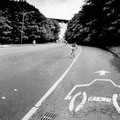Cyclists or road lice
Tagged as: cycling repressionNeighbourhoods: lancaster
"I don't want to moderate oppression; I want to eradicate it," is how Aurora put it. She was one of the organisers of a small conference on 'Bike Politics' at Lancaster University held on Thursday and Friday (16th and 17th) which brought together 25 sociologists, town planners, campaigners and activists from all over the UK and beyond.

Click on a thumbnail for a slideshow view
The theme of the cities and the streets being designed around motorists was a recurring one. The case was made that there are powerful vested interests aiming to keep selling cars and to maintain the status-quo.
It was emphasised, however, that we should not create a false conflict between cyclists and cars. Prior to the 1930s the road was seen as a commons, the public highway, and cycle-lanes framed as a type of enclosure. What was once a space for all has become a zone entirely for the motorised. So this is about reclaiming our spaces for the benefit of all.
There was also a discussion on direct action and whether breaking unjust laws whilst cycling could be construed as a form of direct action. By using sections of pavement to avoid dangerous junctions to allow cyclists to take journeys that would otherwise not be taken, and by ignoring one-way streets which are one-way solely for the benefit of motorists, it can be argued we are merely reclaiming our space.
There was a provocative talk about reducing danger by Robert Davis from the Road Danger Reduction Forum which continued in an highly confrontational attitude with respect to road safety. Instead of trying to reduce fatalities and injury he wants people to look at reducing accident rates. (If everyone stayed away from a 'dangerous' section of road it would have no accidents but it would be far from safe.)
The real mantra should be accountability of drivers and the consequences of their driving: cycling isn't dangerous but driving is - motorists kill far more people than bikes. In the 1920/30s the cyclists successfully resisted compulsory registration, compulsory rear lights and compulsory cycling in bike lanes so that the blame for cars hitting bikes was not transferred onto the bike for not being correctly equipped - the responsibility should rest on the one causing danger of injury or death.
The road safety lobby comes from the motoring industry and would like "everyone to be driving Volvos", as if you are in one then you are safe, even if large quantities of steel and rigid frame puts everyone else at more risk. The road safety lobby wants to make helmets compulsory even though the evidence that increased helmet use leads to an overall reduction in injuries is scant, and it is an example blaming the victim rather than the perpetrator. There are also powerful arguments to be made that increased cycling rates leads to reduced accident rates, and that, conversely, compulsory helmet use creates the illusion of safer cycling by reducing cycling rates as a whole, rather than make any given journey safer.
The international element raised issues about the role of Critical Mass rides and:
- Cycling 'best practise' tourism in the USA where cities compete to be cycle friendly as a form of self-promotion with bike lanes seen as 'the white stripes of gentrification'.
- The decline and marginalisation of cycling in India (with cycling rates around 30%) where they see what we have in the West and aspire to the "car culture" with cyclists being given a very low status.
- How Cape Town grapples with cycling in a post-apartheid city space and haplessly tries to copy other global cites.
In conclusion: a cycling society has the potential to be less hierarchical (bikes are cheap and almost universally affordable) and sustainable (by not relying on fossil fuels in the quantities that motorised vehicles do). There was a sense that we want not simply to create more cyclists, but also to use bikes as a tool for challenging current injustices in society: We don't want bike lanes - we want justice.





